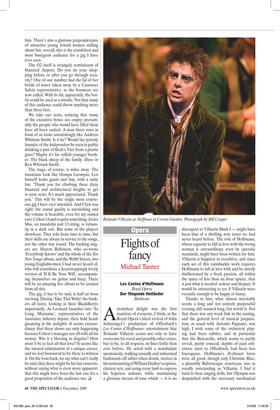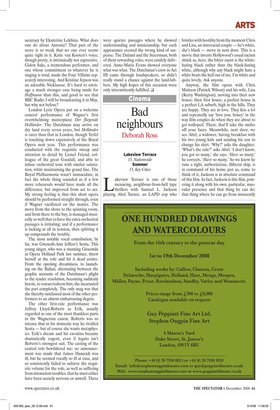Flights of fancy
Michael Tanner
Les Contes d’Hoffmann Royal Opera Der fliegende Holländer Barbican
Astonished delight was the first reaction, of everyone, I think, at the Royal Opera’s latest revival of John Schlesinger’s production of Offenbach’s Les Contes d’Hoffmann: astonishment that Rolando Villazón seems not only to have overcome his vocal and possibly other crises, but to be, in all respects, in finer fettle than ever before. He acted with a nonchalant spontaneity, walking casually and unharmed backwards off tables when drunk, tireless in his surmounting of William Dudley’s copious, cluttery sets, and using every limb to express his hopeless ardours, while maintaining a glorious stream of tone which — it is no disrespect to Villazón Mark I — might have been that of a thrilling new tenor we had never heard before. The role of Hoffmann, whose capacity to fall in love with the wrong woman is extraordinary even by operatic standards, might have been written for him. Villazón is happiest in overdrive, and since each act of this ramshackle work requires Hoffmann to fall in love with and be utterly disillusioned by a fresh passion, all within the space of less than an hour apiece, that is just what is needed: ardour and despair. It would be interesting to see if Villazón were versatile enough to be happy or funny.
Thanks to him, what almost inevitably seems a long and not entirely purposeful evening still seemed long, but worth it. Not that there was any weak link in the casting, and the general level of musical preparation, as usual with Antonio Pappano, was high. I wish some of the orchestral playing had been subtler, and in particular that the Barcarolle, which seems to partly reveal, partly conceal, depths of pain otherwise alien to Offenbach, had been less foursquare. Hoffmann’s ill-chosen loves were all good, though only Christine Rice, a plausibly Rubenesque courtesan, was as vocally outstanding as Villazón. I find it hard to bear singing dolls, but Olympia was despatched with the necessary mechanical accuracy by Ekaterina Lekhina. What does one do about Antonia? That part of the score is so weak that no one ever seems quite right in it. Katie van Kooten’s voice, though pretty, is intrinsically not expressive. Gidon Saks, a tremendous performer, and one whose commitment to whatever he is singing is total, made the Four Villains separately interesting. And Kristine Jepson was an adorable Nicklausse. It’s hard to envisage a much stronger case being made for Hoffmann than this, and good to see that BBC Radio 3 will be broadcasting it in May, but why not before?
London Lyric Opera put on a welcome concert performance of Wagner’s first overwhelming masterpiece Der fliegende Holländer. The Dutchman may arrive on dry land every seven years, but Holländer is rarer than that in London, though Terfel is touching down expensively at the Royal Opera next year. This performance was conducted with the requisite sweep and attention to detail by Lionel Friend, colleague of the great Goodall, and able to infuse orchestral tone with similar saturation, while maintaining the grand line. The Royal Philharmonic wasn’t immaculate, in fact the whole thing sounded as if a few more rehearsals would have made all the difference, but improved from act to act. My strong feeling is that this short opera should be performed straight through, even if Wagner vacillated on the matter. The move from the shore to the spinning room, and from there to the bay, is managed musically so well that to have the extra orchestral passages is irritating; and if a performance is lacking at all in tension, then splitting it up compounds the trouble.
The most notable vocal contribution, by far, was Gweneth-Ann Jeffers’s Senta. This young singer, who was a stunning Gioconda at Opera Holland Park last summer, threw herself at the role and hit it dead centre. From the opening dreaminess, to launching on the Ballad, alternating between the graphic accounts of the Dutchman’s plight to the tender resolution, becoming suddenly heroic, to rescue/redeem him, she incarnated the part completely. The only snag was that she thereby outclassed most of the other performers to an almost embarrassing degree.
The other first-rate performance was Jeffrey Lloyd-Roberts as Erik, usually regarded as one of the most thankless parts in the Wagnerian canon. Roberts was so intense that in his domestic way he rivalled Senta — but of course she wants metaphysics. Erik’s dream and his cavatina became dramatically cogent, even if legato isn’t Roberts’s strongest suit. The casting of the central role bewildered me: no announcement was made that James Hancock was ill, but he seemed vocally so ill at ease, and so consistently failed to achieve the requisite volume for the role, as well as suffering from intonation troubles, that he must either have been acutely nervous or unwell. There were quieter passages where he showed understanding and musicianship, but each appearance created the wrong kind of suspense. The Daland and the Steersman, both of them rewarding roles, were crudely delivered. Anne-Marie Evans showed everyone what was what. The Dutchman’s crew in Act III came through loudspeakers, so didn’t really stand a chance against the land-lubbers. My high hopes of this occasion were only intermittently fulfilled. ❑



















































































 Previous page
Previous page